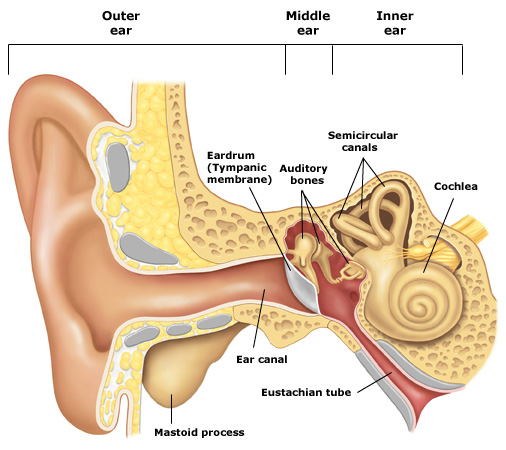Care of Our Ear
The main functions of the inner ear are hearing and maintaining balance. This remarkable structure is housed deep in the bones of the skull on the side of the head and protected from external injury.
The outer ear helps in channeling sound to the middle ear and helps in localizing sounds. The middle ear transfers sound to the inner ear where the sound is received and transferred to the brain. The outer part of the external ear canal has hair, sweat glands and specialised glands which produce a secretion called cerumen or as it is more popularly known-ear wax.
This secretion is not dirt as people assume but has a definite function of lubricating the skin and protecting the ear from infections from bacteria and fungi. The ear has a unique method of cleaning itself and only in very rare instances does it need to be cleaned.
In some people the wax doesn’t come out by itself, sometimes there is a very narrow ear canal which is present from birth or has become narrow following injury or repeated infection. This can result in a blocked sensation of the ear and pain if there is superadded infection. Impacted wax has to be physically removed, by syringing [washing], by suction or by removal using a metal hook or curette. This procedure has to be performed by an ENT surgeon.
The use of ear buds, sticks and hair pins to clean the ear is not desirable, and is dangerous. The number of people who accidentally damage their ears while attempting to clean them is amazing. The resultant injury to the external ear and middle ear is very painful with the additional risk of loss of hearing. Damage to the ear drum and middle ear ossicles needs expensive microsurgery to correct.
 When does the ear need attention? When the ear is painful, when there is discharge, when there is hearing loss, noises in the ear or giddiness, the ear needs to be examined. Consult your Otologist if you have any such complaints, which last for more than a day or increases in severity.
When does the ear need attention? When the ear is painful, when there is discharge, when there is hearing loss, noises in the ear or giddiness, the ear needs to be examined. Consult your Otologist if you have any such complaints, which last for more than a day or increases in severity.
Protect your ear from excessive sound. Noise can damage your inner ear and make you deaf. If you are working in a noisy environment for a long time you need to protect your ear by using ear plugs or ear muffs. Certain people are susceptible to deafness due to noise and have to be particularly careful. Remember that loud noise is produced at home also- by electrical appliances, personal stereo music systems and vehicles, this can also damage your ears.
Medications are known to cause deafness and giddiness, these ototoxic drugs are many and include some antibiotics, aspirin and others. If you have a hearing problem, inform your physician and enquire if the drugs prescribed are potentially toxic to the ear.
Ageing affects the entire body and the ear is no exception, deafness with age is well known and may require amplification of sound using hearing aids.
Infections of the middle ear are a well known cause of pain, fever and deafness, and are not to be taken lightly as these infections can spread to the brain with disastrous results. Children are more likely to develop ear infections. Small children are unable to express themselves, high fever, crying and rubbing of their ears may be the only symptom of ear infection. School going children are prone to develop colds and blocked ears. Collection of fluid in the ears following colds can result in blocked ears and very often the only evidence of this mild deafness maybe the child sitting close to the TV, inattentiveness and poor scholastic performance in school. These conditions need to be evaluated and managed adequately to prevent long lasting effects on the ear.
Some unfortunate people have lost their hearing due to various causes. New strides in medical technology can help some of these people, advanced hearing aids and cochlear implants are options now available for those with severe deafness.
The chirping of birds, the laughter of children and strains of music fill our lives with happiness. Sound is a major dimension of our senses. This great gift from God is to be cherished and protected, take care of your ears.
DR Tambi Cherian
Professor of Otorhinolaryngology Head and Neck Surgery
Special interest in Otology and Laryngology

